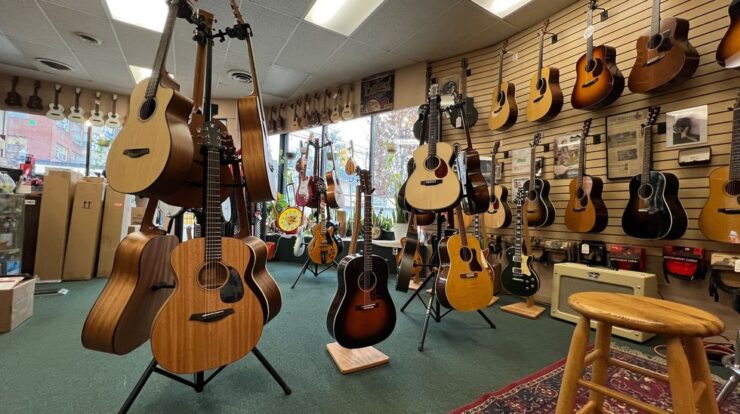
This post was originally published on this site

We’ve all heard those classic phrases: “Do what you love, and you’ll never work a day in your life!” or Elbert Hubbard’s “Work to become, not to acquire,” which is, I think, more zen than any of us have time to process these days. This column is about that little thing that every single guitarist has asked themselves: What if I worked in a guitar shop?
Here are some tips and insights from the first 13 years of a long career in the instrument game.
Home Base: If you live in an area with a great music store … congrats! You’re at an advantage! Big-box stores have muscled out a lot of brick-and-mortar shops over the last 20 years, and if you and your community have kept a small-to-large music business going, I applaud you! Even if you just go in for strings and picks, the folks at that shop know you, and they’re happier than you can imagine that you continue to choose them. This is, most likely, the shop that you are interested in working for.
Are You Guys Hiring? No. (Or Are We?): In 2010, I was a scrappy avant-folk fingerpicking guitarist who managed an art supply store about four blocks from Acoustic Music Works (now my forever home) in Pittsburgh, Pennsylvania. I would dip over on my lunch breaks, playing guitars from Collings and Huss & Dalton, instruments that I could only dream of owning. Steve Miklas, the store owner, acknowledged my used Larrivée OM as a solid purchase and encouraged me to play anything I wanted in the shop. He would occasionally ask me pointed questions about my art store gig, feeling out my retail chops—the chops that matter when the music instrument industry is how you make your living.
Believe it or not, you don’t have to be a great player! It’s about digging the instruments on a deep level, desperately wanting to know how they work. Let’s just call it “passion.” Steve could tell that I was way more into guitars than the average customer, plus we got along great and he knew that I could handle a retail environment. He hatched a plan to steal me from my art store job, and we’ve been at it together ever since!
Dealing with People: This is the worst and the best part. Customers are going to come at you from every direction and from all corners of the world. Having retail chops also means having a somewhat thick skin. When you get an email that just says “BEST PRICE?” you can’t spend a lot of time thinking, “Now that just sounds rude. Why didn’t they ask me about the guitar? Why didn’t they introduce themselves?” Tell them, and move on. There are more of these dispassionate interactions than ever, but you can’t let it break you, because you need to save up energy to answer the good questions, offer guidance, and transfer enthusiasm for the products that you’re selling.
Wearing All Those Hats: Some shops have bigger crews and a clear delineation of jobs, while many have smaller crews where employees do a number of jobs. My official title is shop manager but my jobs include lead luthier/tech, photographer, videographer, copywriter/copy editor, social media coordinator, web designer, shipping and receiving, graphic design, and lowly store clerk who rings up sales at the register. If you excel in any of those areas, let your skills be known to the powers that be. The majority of transactions occur online, and fan bases crop up around a shop’s YouTube channel, so sharpen those Photoshop, Lightroom, and Premiere Pro skills and they will serve you very well.
“Believe it or not, you don’t have to be a great player! It’s about digging the instruments on a deep level, desperately wanting to know how they work.”
If you’re vying for a job on the tech/repair side of things, have a portfolio ready, including before/after pics, a log of the jobs you’ve done, instruments you’ve built, and whatever formal training you have. An applicant who says, “I’d love to learn to work on guitars,” means we have to devote a lot of attention to bringing them up to speed, versus getting an immediate contribution for the good of the shop. Like most jobs, the deeper the resume, the higher the paycheck.
That’s the crash course, but there’s so much more! This is a dream job in a lot of ways, but burnout is always over the horizon if one isn’t careful. Like any job, it’s important to keep a work/life balance and approach things with positivity. It definitely ain’t sitting around jamming with your buddies all day! Feel free to reach out with any questions, but sorry, we’re not hiring right now. Or are we?



